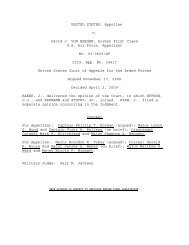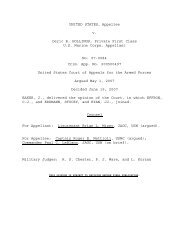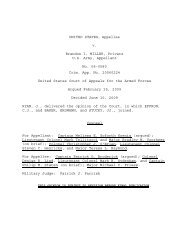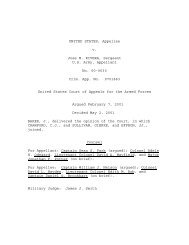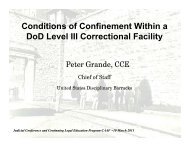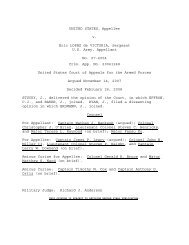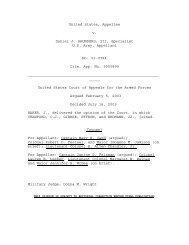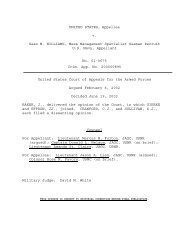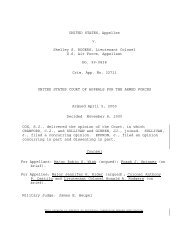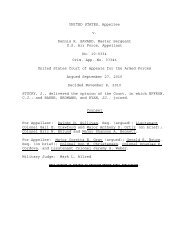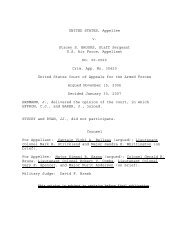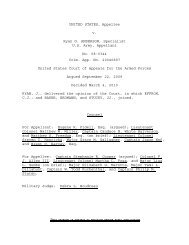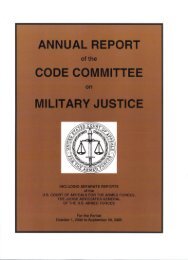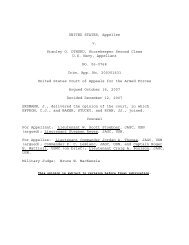U.S. v. Gooch - United States Court of Appeals for the Armed Forces
U.S. v. Gooch - United States Court of Appeals for the Armed Forces
U.S. v. Gooch - United States Court of Appeals for the Armed Forces
You also want an ePaper? Increase the reach of your titles
YUMPU automatically turns print PDFs into web optimized ePapers that Google loves.
UNITED STATES, Appellee<br />
v.<br />
Bruce E. GOOCH, Lieutenant Colonel<br />
U.S. Air Force, Appellant<br />
No. 10-0251<br />
Crim. App. No. 37303<br />
<strong>United</strong> <strong>States</strong> <strong>Court</strong> <strong>of</strong> <strong>Appeals</strong> <strong>for</strong> <strong>the</strong> <strong>Armed</strong> <strong>Forces</strong><br />
Argued November 3, 2010<br />
Decided February 9, 2011<br />
BAKER, J., delivered <strong>the</strong> opinion <strong>of</strong> <strong>the</strong> <strong>Court</strong>, in which EFFRON,<br />
C.J., and ERDMANN, J., joined. STUCKY, J., filed a separate<br />
opinion dissenting in part and concurring in <strong>the</strong> result, in<br />
which RYAN, J., joined.<br />
Counsel<br />
For Appellant: Captain Reggie D. Yager (argued); Major Shannon<br />
A. Bennett, Major Michael A. Burnat, and Major Darrin K. Johns<br />
(on brief).<br />
For Appellee: Major Naomi N. Porterfield (argued); Colonel Don<br />
M. Christensen, Lieutenant Colonel Jeremy S. Weber, Major<br />
Coretta E. Gray, and Gerald R. Bruce, Esq. (on brief).<br />
Amicus Curiae <strong>for</strong> Appellant: Michael Zisser (law student)<br />
(argued); Frank Gulino, Esq. (supervising attorney) and Michael<br />
Levin (law student) (on brief) -- <strong>for</strong> <strong>the</strong> H<strong>of</strong>stra University<br />
School <strong>of</strong> Law.<br />
Military Judge: William M. Burd<br />
THIS OPINION IS SUBJECT TO REVISION BEFORE FINAL PUBLICATION.
<strong>United</strong> <strong>States</strong> v. <strong>Gooch</strong>, No. 10-0251/AF<br />
Judge BAKER delivered <strong>the</strong> opinion <strong>of</strong> <strong>the</strong> <strong>Court</strong>.<br />
At a general court-martial convened at Sheppard Air Force<br />
Base, Texas, a panel composed <strong>of</strong> <strong>of</strong>ficer members convicted<br />
Appellant, contrary to his pleas, <strong>of</strong> one specification <strong>of</strong> making<br />
a false <strong>of</strong>ficial statement, three specifications <strong>of</strong> engaging in<br />
conduct unbecoming an <strong>of</strong>ficer and a gentleman, and one<br />
specification <strong>of</strong> fraternization, in violation <strong>of</strong> Articles 107,<br />
133, and 134, Uni<strong>for</strong>m Code <strong>of</strong> Military Justice (UCMJ), 10 U.S.C.<br />
§§ 907, 933, 934 (2006). The adjudged and approved sentence<br />
consists <strong>of</strong> a dismissal and a reprimand.<br />
On review, <strong>the</strong> <strong>United</strong> <strong>States</strong> Air Force <strong>Court</strong> <strong>of</strong> Criminal<br />
<strong>Appeals</strong> affirmed. <strong>United</strong> <strong>States</strong> v. <strong>Gooch</strong>, No. ACM 37303, 2009<br />
CCA LEXIS 414, at *23, 2009 WL 4110962, at *8 (A.F. Ct. Crim.<br />
App. Nov. 24, 2009).<br />
We granted review <strong>of</strong> <strong>the</strong> following three issues: 1<br />
I. WHETHER THE PROCESS FOR SELECTING PANEL MEMBERS<br />
FOR APPELLANT’S GENERAL COURT-MARTIAL WAS IMPROPER IN<br />
LIGHT OF ARTICLE 25, UCMJ, AND UNITED STATES v.<br />
BARTLETT, 66 M.J. 426 (C.A.A.F. 2008).<br />
II. WHETHER APPELLANT RECEIVED INEFFECTIVE ASSISTANCE<br />
OF COUNSEL WHEN, AFTER THE MILITARY JUDGE LEARNED<br />
DURING SENTENCING DELIBERATIONS THAT THE MEMBERS HAD<br />
IMPROPERLY RECONSIDERED A FINDING OF NOT GUILTY TO<br />
SPECIFICATION TWO OF THE ADDITIONAL CHARGE, AND AFTER<br />
1 Oral argument in this case was heard at <strong>the</strong> H<strong>of</strong>stra University<br />
School <strong>of</strong> Law, Hempstead, New York, as part <strong>of</strong> <strong>the</strong> <strong>Court</strong>’s<br />
“Project Outreach.” See <strong>United</strong> <strong>States</strong> v. Mahoney, 58 M.J. 346,<br />
347 n.1 (C.A.A.F. 2003). This practice was developed as part <strong>of</strong><br />
a public awareness program to demonstrate <strong>the</strong> operation <strong>of</strong> a<br />
federal court <strong>of</strong> appeals and <strong>the</strong> military justice system.<br />
2
<strong>United</strong> <strong>States</strong> v. <strong>Gooch</strong>, No. 10-0251/AF<br />
STATING THAT HE WAS INCLINED TO DISMISS THE<br />
SPECIFICATION IN ORDER TO CURE THE ERROR, APPELLANT’S<br />
TRIAL DEFENSE COUNSEL URGED THE MILITARY JUDGE NOT TO<br />
DISMISS THE SPECIFICATION.<br />
III. WHETHER THE LOWER COURT ERRED IN HOLDING THAT<br />
THE DOCTRINE OF “WAIVER” AND “INVITED ERROR” BARRED<br />
CONSIDERATION OF APPELLANT’S CLAIM OF INEFFECITVE<br />
ASSISTANCE OF COUNSEL.<br />
For <strong>the</strong> reasons set <strong>for</strong>th below, we conclude that <strong>the</strong><br />
process used <strong>for</strong> screening panel members <strong>for</strong> Appellant’s court-<br />
martial was inconsistent with Article 25, UCMJ. However,<br />
Appellant did not suffer material prejudice to a substantial<br />
right; as required by law he was tried by a fair and impartial<br />
panel, including one free from racial bias or taint. Fur<strong>the</strong>r,<br />
we conclude based on <strong>the</strong> particular facts <strong>of</strong> this case and<br />
applicable Strickland standards, that Appellant did not receive<br />
ineffective assistance <strong>of</strong> counsel in <strong>the</strong> context <strong>of</strong> Issue II.<br />
As a result, we need not reach <strong>the</strong> third issue. 2 There<strong>for</strong>e, we<br />
affirm <strong>the</strong> <strong>United</strong> <strong>States</strong> Air Force <strong>Court</strong> <strong>of</strong> Criminal <strong>Appeals</strong>.<br />
I. BACKGROUND<br />
A. Member Selection<br />
Appellant was charged with inter alia six counts <strong>of</strong> making<br />
unwanted sexual advances on five female servicemembers,<br />
including four enlisted servicemembers and one subordinate<br />
<strong>of</strong>ficer under his command, between July 2005 and May 2007. At<br />
2 We note, however, that an appellant cannot waive a claim <strong>of</strong><br />
ineffective assistance <strong>of</strong> counsel where waiver is based on <strong>the</strong><br />
very advice he asserts was ineffective.<br />
3
<strong>United</strong> <strong>States</strong> v. <strong>Gooch</strong>, No. 10-0251/AF<br />
<strong>the</strong> time <strong>of</strong> <strong>the</strong> alleged incidents, Appellant, an African<br />
American Lieutenant Colonel (Lt Col), was <strong>the</strong> Mission Support<br />
Squadron (MSS) Commander in <strong>the</strong> 82d Training Wing (82 TRW),<br />
Sheppard Air Force Base (AFB), Texas. Both wings at Sheppard<br />
AFB, <strong>the</strong> 82 TRW and <strong>the</strong> 80th Flying Training Wing (80 FTW), <strong>for</strong>m<br />
part <strong>of</strong> <strong>the</strong> Second Air Force (2 AF), headquartered at Keesler<br />
AFB, Mississippi. The Commanding General 2 AF is <strong>the</strong> general<br />
court-martial convening authority (CA) <strong>for</strong> <strong>the</strong>se two wings.<br />
As part <strong>of</strong> <strong>the</strong> “general process” <strong>of</strong> member selection, <strong>the</strong><br />
82 TRW military justice section developed a pool <strong>of</strong> potential<br />
panel members <strong>for</strong> <strong>the</strong> CA’s consideration by asking each unit to<br />
provide a list <strong>of</strong> nominees consisting <strong>of</strong> <strong>the</strong>ir “most qualified<br />
individuals” (quarterly list). In <strong>the</strong> case <strong>of</strong> an <strong>of</strong>ficer-<br />
accused, once <strong>the</strong> pool was generated, <strong>the</strong> military justice<br />
section would initially screen <strong>the</strong> quarterly list based on<br />
availability, grade and rank be<strong>for</strong>e <strong>for</strong>warding <strong>the</strong> remaining<br />
nominees to <strong>the</strong> CA <strong>for</strong> consideration. According to <strong>the</strong><br />
testimony <strong>of</strong> Sergeant Martin, <strong>the</strong> noncommissioned <strong>of</strong>ficer in<br />
charge (NCOIC) <strong>of</strong> <strong>the</strong> 82 TRW military justice section, 2 AF had<br />
a written policy requiring 82 TRW to <strong>for</strong>ward a list <strong>of</strong> “12 to 14<br />
members” to <strong>the</strong> CA <strong>for</strong> consideration.<br />
In this case, <strong>the</strong> quarterly list contained an<br />
“insufficient” number <strong>of</strong> <strong>of</strong>ficers outranking Appellant to<br />
<strong>for</strong>ward to <strong>the</strong> CA. As a result, <strong>the</strong> NCOIC <strong>the</strong>n obtained a<br />
4
<strong>United</strong> <strong>States</strong> v. <strong>Gooch</strong>, No. 10-0251/AF<br />
master list <strong>of</strong> all members <strong>of</strong> grade “O-5 and above with <strong>the</strong> date<br />
<strong>of</strong> rank prior to [Appellant]” from both wings (master list).<br />
The master list contained <strong>for</strong>ty-six <strong>of</strong>ficers, four <strong>of</strong> whom were<br />
African Americans. In <strong>the</strong> words <strong>of</strong> <strong>the</strong> NCOIC:<br />
Because <strong>of</strong> <strong>the</strong> rank <strong>of</strong> <strong>the</strong> accused, we [<strong>the</strong> military<br />
justice section] were concerned about <strong>the</strong> existing<br />
[quarterly] list <strong>of</strong> members that we had. . . . So <strong>the</strong><br />
concern was <strong>the</strong> date <strong>of</strong> rank and <strong>the</strong> actual O-5 list<br />
that we have wasn’t sufficient <strong>for</strong> sending <strong>for</strong>ward,<br />
and <strong>the</strong>re were o<strong>the</strong>r concerns regarding knowledge -–<br />
possible conflicting knowledge <strong>of</strong> <strong>the</strong> case or maybe a<br />
personal relationship with Lieutenant Colonel <strong>Gooch</strong><br />
and his -– by virtue <strong>of</strong> his status as <strong>the</strong> MSS<br />
Commander.<br />
In response, <strong>the</strong> NCOIC contacted <strong>the</strong> military justice<br />
<strong>of</strong>fice at 2 AF <strong>for</strong> guidance. The staff at 2 AF shared <strong>the</strong><br />
NCOIC’s concern, but only as to 82 TRW. The staff at 2 AF and<br />
<strong>the</strong> NCOIC at 82 TRW <strong>the</strong>n came to a “group decision” to limit <strong>the</strong><br />
availability check <strong>of</strong> potential members from 82 TRW to those who<br />
arrived on base after Appellant’s date <strong>of</strong> deployment. This<br />
reduced <strong>the</strong> number <strong>of</strong> potential members on <strong>the</strong> master list to<br />
seventeen, including one <strong>of</strong> <strong>the</strong> previously listed African<br />
American <strong>of</strong>ficers. Subsequently, in accordance with standard<br />
operating procedure, <strong>the</strong> NCOIC checked on <strong>the</strong> potential<br />
availability <strong>of</strong> this pool <strong>of</strong> <strong>of</strong>ficers. Seven <strong>of</strong> <strong>the</strong> seventeen<br />
potential members indicated <strong>the</strong>y would not be available when <strong>the</strong><br />
NCOIC in<strong>for</strong>med <strong>the</strong>m that <strong>the</strong> trial date was “unknown” and would<br />
be “sometime in <strong>the</strong> spring time frame.” With only ten names<br />
5
<strong>United</strong> <strong>States</strong> v. <strong>Gooch</strong>, No. 10-0251/AF<br />
remaining, <strong>the</strong> NCOIC again asked <strong>the</strong> staff at 2 AF <strong>for</strong> guidance.<br />
According to Sergeant Martin, 2 AF told her to “[s]end us what<br />
you have and we will supplement.” She did so. The ten names<br />
were <strong>for</strong>warded to <strong>the</strong> CA who personally selected nine <strong>of</strong>ficers<br />
by initialing next to those <strong>of</strong>ficers names. The selected<br />
<strong>of</strong>ficers included <strong>the</strong> remaining African American <strong>of</strong>ficer. In<br />
addition, <strong>the</strong> CA made a substantive correction to <strong>the</strong><br />
memorandum, which he initialed.<br />
The trial date was not set until after Appellant’s<br />
Resignation in Lieu <strong>of</strong> Decision was processed. This was denied<br />
sometime in April 2008. When <strong>the</strong> NCOIC subsequently contacted<br />
<strong>the</strong> nine remaining members with a trial date in June 2008, <strong>the</strong><br />
remaining African American <strong>of</strong>ficer and one o<strong>the</strong>r <strong>of</strong>ficer were no<br />
longer available. 3 The CA <strong>the</strong>n supplemented <strong>the</strong> list with<br />
additional names from Lackland AFB and Maxwell AFB. 4<br />
B. Specification 2 <strong>of</strong> <strong>the</strong> Additional Charge<br />
After <strong>the</strong> president <strong>of</strong> <strong>the</strong> panel announced <strong>the</strong> panel’s<br />
findings in open court, he in<strong>for</strong>med <strong>the</strong> military judge that a<br />
member had proposed reconsideration <strong>of</strong> <strong>the</strong> finding to<br />
Specification 2 <strong>of</strong> <strong>the</strong> Additional Charge (Specification 2).<br />
3 The African American <strong>of</strong>ficer, Lt Col Linscomb, requested to be<br />
released from service as she had nonrefundable tickets to attend<br />
her son’s high school graduation.<br />
4 The supplements initially included six names from Lackland AFB<br />
and one name from Maxwell AFB.<br />
6
<strong>United</strong> <strong>States</strong> v. <strong>Gooch</strong>, No. 10-0251/AF<br />
This would have resulted in an improper reconsideration <strong>of</strong> <strong>the</strong><br />
findings under Rule <strong>for</strong> <strong>Court</strong>s-Martial (R.C.M.) 924. In<br />
response, <strong>the</strong> parties held an R.C.M. 802 conference, attended by<br />
Appellant, in which <strong>the</strong> military judge indicated he was inclined<br />
to dismiss Specification 2 and instruct <strong>the</strong> members to disregard<br />
it in <strong>the</strong>ir sentencing deliberations. The military judge also<br />
indicated, however, that, “If any one or more members said <strong>the</strong>y<br />
couldn’t disregard it, <strong>the</strong>n I would declare a mistrial as to<br />
sentencing and we’d get a new panel.” The military judge<br />
ultimately decided not to dismiss Specification 2 based on <strong>the</strong><br />
following discussion between <strong>the</strong> military judge, defense<br />
counsel, and Appellant:<br />
Military Judge: What would you like to do?<br />
Defense Counsel: Your Honor, . . . this just does not rise<br />
to <strong>the</strong> level <strong>of</strong> impinging upon Colonel <strong>Gooch</strong>’s<br />
constitutional rights. It appears <strong>the</strong> members were<br />
conscientious, did <strong>the</strong> best <strong>the</strong>y could, and <strong>the</strong>y came up<br />
with a finding, and we are not requesting that you dismiss<br />
Specification 2 <strong>of</strong> <strong>the</strong> Additional Charge. And we would<br />
like <strong>the</strong>m to continue with <strong>the</strong>ir proceedings on sentencing<br />
and <strong>the</strong>ir deliberations.<br />
Military Judge: And Lieutenant Colonel <strong>Gooch</strong>, are you in<br />
agreement with <strong>the</strong> position your counsel has just stated?<br />
Appellant: Yes, sir.<br />
Military Judge: . . . Is this a waiver <strong>of</strong> appellate<br />
consideration <strong>of</strong> any error involved in this?<br />
Defense Counsel: Your Honor, <strong>of</strong>f <strong>the</strong> cuff, <strong>the</strong> potential<br />
is that some things are waived and o<strong>the</strong>r issues on appeal<br />
are not waived, <strong>of</strong> course, so we do not want you to dismiss<br />
7
<strong>United</strong> <strong>States</strong> v. <strong>Gooch</strong>, No. 10-0251/AF<br />
Specification 2 <strong>of</strong> <strong>the</strong> Additional Charge, nor are we<br />
requesting that you dismiss it.<br />
II. DISCUSSION<br />
A. Panel Selection Under Article 25, UCMJ<br />
“‘As a matter <strong>of</strong> due process, an accused has a<br />
constitutional right, as well as a regulatory right, to a fair<br />
and impartial panel.’” <strong>United</strong> <strong>States</strong> v. Downing, 56 M.J. 419,<br />
421 (C.A.A.F. 2002) (quoting <strong>United</strong> <strong>States</strong> v. Wiesen, 56 M.J.<br />
172, 174 (C.A.A.F. 2001)). These rights are upheld through<br />
application <strong>of</strong> selection criteria contained in Article 25, UCMJ,<br />
as well as <strong>the</strong> use <strong>of</strong> peremptory and causal challenges during<br />
voir dire. Voir dire is <strong>the</strong> principal legal instrument used to<br />
ensure that those members who qualify <strong>for</strong> service as panel<br />
members can do so free from conflict and bias. R.C.M.<br />
912(f)(1)(N), <strong>for</strong> example, provides, “[a] member shall be<br />
excused <strong>for</strong> cause whenever it appears that <strong>the</strong> member: Should<br />
not sit as a member in <strong>the</strong> interest <strong>of</strong> having <strong>the</strong> court-martial<br />
free from substantial doubt as to legality, fairness, and<br />
impartiality.” (emphasis added). Examples <strong>of</strong> scenarios under<br />
subsection (N) that may be grounds <strong>for</strong> challenge include where a<br />
member “has a decidedly friendly or hostile attitude toward a<br />
party.” R.C.M. 912(f)(1)(N) Discussion (emphasis added); see<br />
also <strong>United</strong> <strong>States</strong> v. Hollings, 65 M.J. 116, 119 (C.A.A.F. 2007)<br />
8
<strong>United</strong> <strong>States</strong> v. <strong>Gooch</strong>, No. 10-0251/AF<br />
(“We have enjoined military judges to follow <strong>the</strong> liberal grant<br />
mandate in evaluating challenges <strong>for</strong> cause.”).<br />
Article 25(a), UCMJ, generally provides that “[a]ny<br />
commissioned <strong>of</strong>ficer on active duty is eligible to serve on all<br />
courts-martial.” Section 25(d), however, delimits this<br />
eligibility. Subsection (d)(1) provides that members junior in<br />
rank or grade to <strong>the</strong> accused are ineligible to serve “[w]hen it<br />
can be avoided.” Subsection (d)(2) fur<strong>the</strong>r provides that a<br />
member is per se ineligible “when he is <strong>the</strong> accuser or a witness<br />
<strong>for</strong> <strong>the</strong> prosecution or has acted as investigating <strong>of</strong>ficer or as<br />
counsel in <strong>the</strong> same case.” It is intuitive that o<strong>the</strong>r<br />
relationships might similarly disqualify an o<strong>the</strong>rwise eligible<br />
<strong>of</strong>ficer during <strong>the</strong> screening process, such as <strong>the</strong> parent <strong>of</strong> a<br />
victim. From among <strong>of</strong>ficers eligible to serve on a court-<br />
martial panel, “<strong>the</strong> convening authority shall detail as members<br />
<strong>the</strong>re<strong>of</strong> such members . . . as, in his opinion, are best<br />
qualified <strong>for</strong> <strong>the</strong> duty by reason <strong>of</strong> age, education, training,<br />
experience, length <strong>of</strong> service, and judicial temperament.”<br />
Article 25(d)(2), UCMJ. Although <strong>the</strong> CA must personally select<br />
<strong>the</strong> court-martial members, he or she may rely on staff and<br />
subordinate commanders to compile a list <strong>of</strong> eligible members.<br />
<strong>United</strong> <strong>States</strong> v. Dowty, 60 M.J. 163, 169-70 (C.A.A.F. 2004).<br />
The operation <strong>of</strong> Article 25, UCMJ, is fur<strong>the</strong>r in<strong>for</strong>med by<br />
case law. As a starting point, this <strong>Court</strong> has identified three<br />
9
<strong>United</strong> <strong>States</strong> v. <strong>Gooch</strong>, No. 10-0251/AF<br />
principles that should in<strong>for</strong>m <strong>the</strong> screening <strong>of</strong> servicemembers<br />
<strong>for</strong> court-martial service: (1) “we will not tolerate an<br />
improper motive to pack <strong>the</strong> member pool,” (2) “systemic<br />
exclusion <strong>of</strong> o<strong>the</strong>rwise qualified potential members based on an<br />
impermissible variable such as rank[, race, or gender] is<br />
improper,” and (3) “this <strong>Court</strong> will be deferential to good faith<br />
attempts to be inclusive and to require representativeness so<br />
that court-martial service is open to all segments <strong>of</strong> <strong>the</strong><br />
military community.” Dowty, 60 M.J. at 171.<br />
Appellant, relying on this <strong>Court</strong>’s opinion in <strong>United</strong> <strong>States</strong><br />
v. Santiago-Davila, 26 M.J. 380 (C.M.A. 1988), argues that as a<br />
result <strong>of</strong> <strong>the</strong> screening methodology used in his case “a<br />
cognizable racial group was impermissibly excluded in violation<br />
<strong>of</strong> Appellant’s due process rights under <strong>the</strong> Fifth Amendment.”<br />
Brief <strong>for</strong> Appellant at 13, <strong>United</strong> <strong>States</strong> v. <strong>Gooch</strong>, No. 10-0251<br />
(C.A.A.F. May 26, 2010). He fur<strong>the</strong>r argues more generally that<br />
<strong>the</strong> process used to screen his panel violated Article 25, UCMJ,<br />
and resulted in an unfair panel. Id. at 14.<br />
1. The Selection Process in Appellant’s Case<br />
Whe<strong>the</strong>r a panel has been properly selected is a question <strong>of</strong><br />
law reviewed de novo. Dowty, 60 M.J. at 171. This <strong>Court</strong> is<br />
bound by <strong>the</strong> military judge’s findings <strong>of</strong> fact unless <strong>the</strong>y are<br />
“clearly erroneous.” Id.<br />
10
<strong>United</strong> <strong>States</strong> v. <strong>Gooch</strong>, No. 10-0251/AF<br />
In this case, <strong>the</strong> NCOIC compiled a list <strong>of</strong> eligible members<br />
<strong>for</strong> consideration by <strong>the</strong> CA based on four screening criteria:<br />
date <strong>of</strong> rank and grade, availability, “possible personal . . .<br />
knowledge <strong>of</strong> <strong>the</strong> case,” and “maybe a personal relationship” with<br />
Appellant, or in <strong>the</strong> words <strong>of</strong> <strong>the</strong> military judge “<strong>the</strong> best<br />
chance <strong>of</strong> not having any personal knowledge <strong>of</strong> <strong>the</strong> accused.”<br />
Screening potential members <strong>of</strong> junior rank or grade is not<br />
only proper; it is required by Article 25(d)(1), UCMJ. Fur<strong>the</strong>r,<br />
although not enumerated as an express criterion in Article 25,<br />
UCMJ, availability in <strong>the</strong> military context is an appropriate<br />
screening factor. This is implicit in <strong>the</strong> overall structure <strong>of</strong><br />
<strong>the</strong> UCMJ, which is intended to “promote justice” as well as “to<br />
assist in maintaining good order and discipline” in an<br />
operational context. Manual <strong>for</strong> <strong>Court</strong>s-Martial, <strong>United</strong> <strong>States</strong><br />
pt. I, para. 3 (2008 ed.) (MCM). It is also reflected in <strong>the</strong><br />
language <strong>of</strong> Article 25(d)(1), UCMJ, contemplating that <strong>the</strong>re may<br />
be circumstances, not at issue here, where service by <strong>of</strong>ficers<br />
junior to an accused “cannot be avoided.” For <strong>the</strong>se reasons,<br />
our case law also recognizes “availability” as a valid<br />
consideration in member selection. See Wiesen, 56 M.J. at 176.<br />
However, “availability” cannot be used to mask exclusion or<br />
evade Article 25, UCMJ, criteria. And, where necessary or<br />
appropriate, it is also subject to judicial review at <strong>the</strong> trial<br />
11
<strong>United</strong> <strong>States</strong> v. <strong>Gooch</strong>, No. 10-0251/AF<br />
level, as was done in this case with respect to <strong>the</strong> two <strong>of</strong>ficers<br />
excused from service based on scheduling conflicts.<br />
However, <strong>the</strong> question remains whe<strong>the</strong>r it was proper <strong>for</strong> <strong>the</strong><br />
NCOIC at Sheppard AFB/military justice to screen-out potential<br />
members based on “possible personal . . . knowledge <strong>of</strong> <strong>the</strong> case”<br />
as well as “maybe a personal relationship” with Appellant.<br />
(Emphasis added). And, as a distinct question, even if such<br />
criteria are permissible, are <strong>the</strong>y permissible where <strong>the</strong>y have<br />
<strong>the</strong> effect <strong>of</strong> limiting or eliminating <strong>the</strong> number <strong>of</strong> African<br />
Americans who serve on a court-martial panel?<br />
We first address Appellant’s most pernicious allegation<br />
that <strong>the</strong> selection <strong>of</strong> panel members was designed to exclude<br />
members <strong>of</strong> Appellant’s race. Appellant cites to Santiago-Davila<br />
and Batson v. Kentucky in support <strong>of</strong> his argument.<br />
In Santiago-Davila, a case involving a Puerto Rican<br />
accused, <strong>the</strong> government used its only peremptory challenge to<br />
exclude a potential member with a Hispanic surname who was<br />
“[r]aised in Puerto Rico.” 26 M.J. at 384-86, 391. The defense<br />
requested that <strong>the</strong> military judge inquire into <strong>the</strong> basis <strong>for</strong> <strong>the</strong><br />
government’s “seemingly discriminatory” challenge. Id. at 385.<br />
The military judge declined to do so because no authority<br />
existed at that time requiring an inquiry. Id. at 386. After<br />
<strong>the</strong> court-martial, but be<strong>for</strong>e reaching this <strong>Court</strong> on appeal, <strong>the</strong><br />
Supreme <strong>Court</strong> decided Batson, which held that a defendant may<br />
12
<strong>United</strong> <strong>States</strong> v. <strong>Gooch</strong>, No. 10-0251/AF<br />
establish a prima facie case <strong>of</strong> purposeful discrimination during<br />
jury selection based solely on evidence concerning a<br />
prosecutor’s exercise <strong>of</strong> a peremptory challenge. 476 U.S. 79,<br />
96 (1986). 5 On appeal, this <strong>Court</strong>, applying Batson, held that<br />
<strong>the</strong> appellant had established a prima facie case <strong>of</strong><br />
discrimination, <strong>the</strong>reby shifting <strong>the</strong> burden at trial to <strong>the</strong><br />
government to present a neutral reason <strong>for</strong> excluding <strong>the</strong> member<br />
in question. Santiago-Davila, 26 M.J. at 391-92.<br />
This case is distinguishable from Santiago-Davila and<br />
Batson. Although <strong>the</strong> screening methodology used had <strong>the</strong> effect<br />
<strong>of</strong> excluding three <strong>of</strong> <strong>the</strong> four eligible African American members<br />
from consideration by <strong>the</strong> CA, <strong>the</strong>re is no evidence in <strong>the</strong> record<br />
<strong>of</strong> improper motive to “pack <strong>the</strong> member pool” or to exclude<br />
members based on race. Indeed, <strong>the</strong> record reflects a good faith<br />
ef<strong>for</strong>t to compile a list <strong>of</strong> eligible candidates <strong>for</strong> <strong>the</strong><br />
convening authority’s selection.<br />
The NCOIC <strong>for</strong> military justice testified that she did not<br />
know <strong>the</strong> racial composition <strong>of</strong> <strong>the</strong> potential members on <strong>the</strong><br />
master list. Nei<strong>the</strong>r did <strong>the</strong> staff at 2 AF advise <strong>the</strong> NCOIC,<br />
directly or indirectly, regarding race, sex, or command<br />
experience as categories <strong>for</strong> inclusion or exclusion on a<br />
potential panel. Nor is <strong>the</strong>re evidence in <strong>the</strong> record that <strong>the</strong><br />
5 In Batson, <strong>the</strong> Supreme <strong>Court</strong> reviewed <strong>the</strong> use <strong>of</strong> peremptory<br />
challenges to remove all African American veniremen in a case<br />
against an African American accused. 476 U.S. at 96.<br />
13
<strong>United</strong> <strong>States</strong> v. <strong>Gooch</strong>, No. 10-0251/AF<br />
staff at 2 AF or <strong>the</strong> CA intended to exclude African Americans<br />
from service. One African American <strong>of</strong>ficer was included in <strong>the</strong><br />
list <strong>of</strong> ten sent to <strong>the</strong> CA and subsequently selected. Thus, <strong>the</strong><br />
military judge’s factual conclusion “that race was not a factor<br />
in <strong>the</strong> selection <strong>of</strong> any <strong>of</strong> <strong>the</strong> court members or non-selection <strong>of</strong><br />
any <strong>of</strong> <strong>the</strong> court members” is not clearly erroneous. In short,<br />
<strong>the</strong> methodology used was not intended to exclude African<br />
Americans. 6<br />
However, our inquiry does not end here. Appellant also<br />
argues that <strong>the</strong> criteria used to screen members violated Article<br />
25, UCMJ, whe<strong>the</strong>r <strong>the</strong>y were race-based or not. Indeed, as Dowty<br />
illustrates, while we have not read Article 25, UCMJ, as an<br />
exclusive list <strong>of</strong> criteria by which potential members are<br />
screened, we have scrutinized with care criteria that fall<br />
outside Article 25, UCMJ, boundaries. Dowty, <strong>for</strong> example,<br />
involved <strong>the</strong> “novel” approach <strong>of</strong> soliciting volunteers to serve<br />
6 Appellant also argues that this case presents a fait accompli<br />
and urges this <strong>Court</strong> to find structural error on that basis.<br />
Brief <strong>for</strong> Appellant, supra at 12-16. As this case does not<br />
present a true fait accompli, we need not accept Appellant’s<br />
invitation. See <strong>United</strong> <strong>States</strong> v. Marsh, 21 M.J. 445, 449<br />
(C.M.A. 1986) (stating that a fait accompli means that <strong>the</strong> CA<br />
“had no real choice but to appoint . . . <strong>the</strong> persons who had<br />
been recommended by his subordinates”). The staff at 2 AF<br />
in<strong>for</strong>med <strong>the</strong> NCOIC that <strong>the</strong>y would supplement <strong>the</strong> list <strong>of</strong> seven,<br />
which <strong>the</strong>y in fact did on more than one occasion. There<strong>for</strong>e,<br />
<strong>the</strong> CA retained and exercised some choice in <strong>the</strong> matter. Given<br />
<strong>the</strong>se holdings, we need not consider Appellant’s claims that<br />
<strong>the</strong>se were structural errors. Brief <strong>for</strong> Appellant, supra at 12-<br />
14.<br />
14
<strong>United</strong> <strong>States</strong> v. <strong>Gooch</strong>, No. 10-0251/AF<br />
on courts-martial panels as a means to supplement <strong>the</strong> member<br />
pool. 60 M.J. at 166. This <strong>Court</strong>, adopting <strong>the</strong> federal<br />
civilian rule against volunteer jurors in <strong>United</strong> <strong>States</strong> v.<br />
Kennedy, 548 F.2d 608, 609 (5th Cir. 1977), rejected that<br />
approach, holding that it injected an irrelevant variable into<br />
<strong>the</strong> procedure established by Congress in Article 25(d)(2), UCMJ,<br />
<strong>for</strong> obtaining a member panel pool. 60 M.J. at 172.<br />
The question here is whe<strong>the</strong>r “possible personal . . .<br />
knowledge <strong>of</strong> <strong>the</strong> case” and possible “personal knowledge <strong>of</strong> <strong>the</strong><br />
accused” were appropriate criteria in this case with which to<br />
categorically exclude service as a panel member. (Emphasis<br />
added). We think not.<br />
First, <strong>the</strong>se categories are not express categories provided<br />
<strong>for</strong> by <strong>the</strong> Congress in Article 25, UCMJ.<br />
Second, <strong>the</strong> text <strong>of</strong> R.C.M. 912 reflects <strong>the</strong> President’s<br />
intent that <strong>the</strong> appropriate mechanism <strong>for</strong> addressing potential<br />
bias or knowledge <strong>of</strong> <strong>the</strong> case and <strong>of</strong> <strong>the</strong> accused is through voir<br />
dire.<br />
Third, this point is particularly apt where <strong>the</strong> category <strong>of</strong><br />
exclusion is conditional involving only “<strong>the</strong> possibility” <strong>of</strong><br />
knowledge, let alone, knowledge that would preclude panel<br />
service. Such selection criteria would act to exclude not only<br />
members with negative or positive biases toward an accused but<br />
15
<strong>United</strong> <strong>States</strong> v. <strong>Gooch</strong>, No. 10-0251/AF<br />
also members with no view one way or <strong>the</strong> o<strong>the</strong>r who could<br />
potentially make it through <strong>the</strong> voir dire process. 7<br />
Fourth, <strong>the</strong> methodology used had <strong>the</strong> effect <strong>of</strong><br />
significantly limiting <strong>the</strong> potential pool <strong>of</strong> <strong>of</strong>ficers from which<br />
<strong>the</strong> CA might apply <strong>the</strong> Article 25, UCMJ, criteria. A majority<br />
<strong>of</strong> eligible members from Appellant’s base were <strong>the</strong>reby excluded<br />
from consideration. The screening method in this case excluded<br />
twenty-nine <strong>of</strong> <strong>the</strong> <strong>for</strong>ty-six eligible <strong>of</strong>ficers on <strong>the</strong> master<br />
list. Once <strong>the</strong> unavailable members were excluded, a list <strong>of</strong><br />
only ten <strong>of</strong>ficers was <strong>for</strong>warded to <strong>the</strong> CA, who selected nine.<br />
For sure, <strong>the</strong> staff at 2 AF correctly advised <strong>the</strong> CA that he<br />
might reach beyond <strong>the</strong> list <strong>of</strong> candidates provided, but <strong>the</strong>y did<br />
so without providing <strong>the</strong> CA with <strong>the</strong> additional knowledge <strong>of</strong> how<br />
many o<strong>the</strong>r <strong>of</strong>ficers had been screened out as well as why <strong>the</strong> CA<br />
might not be inclined to look beyond <strong>the</strong> immediate list. Thus,<br />
ra<strong>the</strong>r than aiding <strong>the</strong> CA, this type <strong>of</strong> screening might unduly<br />
confine <strong>the</strong> manner in which a CA personally selected those who<br />
“in his opinion, are best qualified,” as contemplated by<br />
Congress in Article 25(d)(2), UCMJ.<br />
7 Thus, contrary to <strong>the</strong> dissent’s assertion, we hold only that,<br />
however well-intentioned, <strong>the</strong> staff cannot exclude an entire<br />
class <strong>of</strong> eligible members based on mere possibilities, not that<br />
<strong>the</strong> staff must include all eligible members nor those with<br />
obvious conflicts, <strong>United</strong> <strong>States</strong> v. <strong>Gooch</strong>, __ M.J. __ (4-5)<br />
(C.A.A.F. 2011) (Stucky, J., dissenting in part and concurring<br />
in <strong>the</strong> result, in which Ryan J., joined).<br />
16
<strong>United</strong> <strong>States</strong> v. <strong>Gooch</strong>, No. 10-0251/AF<br />
Fifth, by delimiting <strong>the</strong> pool <strong>of</strong> potential members in this<br />
way <strong>the</strong> Government arguably although not purposefully af<strong>for</strong>ded<br />
itself <strong>the</strong> opportunity in effect to peremptorily challenge any<br />
<strong>of</strong>ficer at 82 TRW who might know Appellant and have a favorable<br />
view <strong>of</strong> Appellant’s pr<strong>of</strong>essional service. That alone is not<br />
grounds <strong>for</strong> causal challenge. See Downing, 56 M.J. at 421-23.<br />
Thus voir dire as provided <strong>for</strong> in Article 41, UCMJ, and<br />
regulated by <strong>the</strong> President under R.C.M. 912, is <strong>the</strong> codal method<br />
<strong>for</strong> identifying and screening members based on potential bias,<br />
not categorical exclusion. Voir dire provides an accused (and<br />
<strong>the</strong> government) with <strong>the</strong> necessary safeguards in <strong>the</strong> <strong>for</strong>m <strong>of</strong><br />
unlimited challenges <strong>for</strong> cause based on actual or implied bias<br />
and <strong>the</strong> liberal grant mandate on <strong>the</strong> record and supervised by<br />
<strong>the</strong> military judge. 8<br />
For <strong>the</strong>se reasons, we hold that possible personal knowledge<br />
<strong>of</strong> <strong>the</strong> case or <strong>the</strong> accused, based on contemporaneous service<br />
alone, is not a proper basis <strong>for</strong> screening potential members<br />
under Article 25, UCMJ. The government is not entitled to<br />
8 These safeguards were carefully applied by <strong>the</strong> military judge<br />
in this case. For example, in dismissing Lt Col C., <strong>the</strong><br />
military judge stated:<br />
I have enough concern, based on everything he said, that<br />
<strong>the</strong>re’s at least a real potential <strong>for</strong> implied bias. And,<br />
given <strong>the</strong> liberal grant mandate <strong>of</strong> <strong>the</strong> appellate courts,<br />
I’m not interested in getting this case reversed because <strong>of</strong><br />
my failure to properly employ <strong>the</strong> liberal grant mandate, as<br />
viewed by <strong>the</strong> appellate courts. The defense challenge <strong>for</strong><br />
cause is granted.<br />
17
<strong>United</strong> <strong>States</strong> v. <strong>Gooch</strong>, No. 10-0251/AF<br />
exclude all potential members who might have a favorable (or<br />
unfavorable) view <strong>of</strong> an accused based on prior pr<strong>of</strong>essional<br />
contact. “[M]aybe a personal relationship” and “any personal<br />
knowledge <strong>of</strong> <strong>the</strong> accused” are not Article 25, UCMJ, criteria.<br />
The mechanism <strong>for</strong> addressing bias, <strong>the</strong> potential <strong>for</strong> bias, or<br />
<strong>the</strong> appearance <strong>of</strong> bias, is through voir dire and <strong>the</strong> use <strong>of</strong><br />
causal and peremptory challenges.<br />
2. Prejudice<br />
Having found nonconstitutional error in <strong>the</strong> application <strong>of</strong><br />
Article 25, UCMJ, we must determine if <strong>the</strong> error “materially<br />
prejudiced <strong>the</strong> substantial rights <strong>of</strong> <strong>the</strong> accused.” Article<br />
59(a), UCMJ. Appellant asks this <strong>Court</strong> to set aside <strong>the</strong> charges<br />
and specifications. Brief <strong>for</strong> Appellant, supra at 22. The<br />
burden <strong>of</strong> persuasion depends on <strong>the</strong> nature <strong>of</strong> <strong>the</strong> error.<br />
In <strong>United</strong> <strong>States</strong> v. Bartlett, this <strong>Court</strong> identified three<br />
categories <strong>of</strong> nonconstitutional error and <strong>the</strong>ir corresponding<br />
burdens. 66 M.J. 426, 430 (C.A.A.F. 2008). First, in <strong>the</strong> case<br />
<strong>of</strong> administrative mistake, <strong>the</strong> appellant must demonstrate<br />
prejudice. Id. Second, where <strong>the</strong> government has intentionally<br />
included or excluded a class <strong>of</strong> eligible members, <strong>the</strong> government<br />
must demonstrate lack <strong>of</strong> harm. Id. Third, in <strong>the</strong> case <strong>of</strong><br />
unlawful command influence, <strong>the</strong> government must prove beyond a<br />
reasonable doubt that <strong>the</strong> error was harmless. Id.<br />
18
<strong>United</strong> <strong>States</strong> v. <strong>Gooch</strong>, No. 10-0251/AF<br />
Although <strong>the</strong> line between each category can be vague, in<br />
this case it is clear. The Government excluded a class <strong>of</strong><br />
potential members from Appellant’s court-martial, based on dates<br />
<strong>of</strong> service at Sheppard AFB, because such persons might have<br />
knowledge <strong>of</strong> <strong>the</strong> case or knowledge <strong>of</strong> Appellant. This was more<br />
than a ministerial mistake, such as <strong>the</strong> omission <strong>of</strong> an Article<br />
25, UCMJ, factor, or an intended name in a memorandum. It was a<br />
categorical exclusion based on dates <strong>of</strong> service at Sheppard AFB.<br />
But Appellant has not demonstrated that <strong>the</strong> error was generated<br />
by unlawful command ef<strong>for</strong>t to influence <strong>the</strong> racial composition<br />
<strong>of</strong> <strong>the</strong> panel nor to “pack <strong>the</strong> panel” with a command perspective. 9<br />
Thus, <strong>the</strong> burden rests with <strong>the</strong> Government to show lack <strong>of</strong> harm.<br />
Id.<br />
We conclude that <strong>the</strong> Government has sustained this burden.<br />
The error in this case did not materially prejudice Appellant’s<br />
right to a fair and impartial panel <strong>for</strong> two reasons. First, <strong>the</strong><br />
Article 25, UCMJ, criteria were applied to <strong>the</strong> potential pool <strong>of</strong><br />
members <strong>for</strong>warded to <strong>the</strong> CA. Appellant does not argue<br />
o<strong>the</strong>rwise. The SJA in this case advised <strong>the</strong> CA that “you may<br />
select court members from <strong>the</strong> list submitted by 82TRW/CC or you<br />
may select o<strong>the</strong>rs as you deem appropriate” and “you should<br />
select members who, in your opinion, are best qualified <strong>for</strong><br />
9 The military judge found that “<strong>the</strong>re has been no unlawful<br />
command influence” in this case. Moreover, this is not an issue<br />
on appeal to this <strong>Court</strong>.<br />
19
<strong>United</strong> <strong>States</strong> v. <strong>Gooch</strong>, No. 10-0251/AF<br />
court-martial duty by reason <strong>of</strong> age, education, training,<br />
experience, length <strong>of</strong> service and judicial temperament.” The<br />
record reflects that <strong>the</strong> CA personally selected <strong>the</strong> members.<br />
Indeed, he made a handwritten correction to <strong>the</strong> text <strong>of</strong> <strong>the</strong> memo<br />
in addition to initialing by certain, but not all, <strong>of</strong> <strong>the</strong> names.<br />
The CA signed his initials next to nine <strong>of</strong> <strong>the</strong> ten members<br />
presented to him from Sheppard AFB and four <strong>of</strong> <strong>the</strong> six presented<br />
from Lackland AFB, and continued to select from supplemental<br />
lists until arriving at <strong>the</strong> final detailing order. Thus,<br />
Appellant has not demonstrated that <strong>the</strong> CA was presented with a<br />
fait accompli. The CA could continue supplementing <strong>the</strong> list<br />
until he was satisfied with his selections and knew that he<br />
could do so.<br />
Second, <strong>the</strong> panel by which Appellant was tried was fair and<br />
impartial. The military judge conducted a rigorous and diligent<br />
voir dire process, in which he properly applied <strong>the</strong> law,<br />
including consideration <strong>of</strong> actual and implied bias. Four <strong>of</strong><br />
Appellant’s five challenges based on implied bias were granted. 10<br />
B. Ineffective Assistance <strong>of</strong> Counsel<br />
The Sixth Amendment guarantees a criminal accused,<br />
including military service members, <strong>the</strong> right to effective<br />
assistance <strong>of</strong> counsel. <strong>United</strong> <strong>States</strong> v. Gilley, 56 M.J. 113,<br />
10 The fifth member was later excused based on Appellant’s<br />
peremptory challenge.<br />
20
<strong>United</strong> <strong>States</strong> v. <strong>Gooch</strong>, No. 10-0251/AF<br />
124 (C.A.A.F. 2001). In assessing <strong>the</strong> effectiveness <strong>of</strong> counsel<br />
we apply <strong>the</strong> standard set <strong>for</strong>th in Strickland v. Washington, 466<br />
U.S. 668, 687 (1984), and begin with <strong>the</strong> presumption <strong>of</strong><br />
competence announced in <strong>United</strong> <strong>States</strong> v. Cronic, 466 U.S. 648,<br />
658 (1984). Gilley, 56 M.J. at 124 (citing <strong>United</strong> <strong>States</strong> v.<br />
Grigoruk, 52 M.J. 312, 315 (C.A.A.F. 2000)).<br />
This <strong>Court</strong> “will not second-guess <strong>the</strong> strategic or tactical<br />
decisions made at trial by defense counsel.” <strong>United</strong> <strong>States</strong> v.<br />
Mazza, 67 M.J. 470, 475 (C.A.A.F. 2009). Where an appellant<br />
“attacks <strong>the</strong> trial strategy or tactics <strong>of</strong> <strong>the</strong> defense counsel,<br />
<strong>the</strong> appellant must show specific defects in counsel’s<br />
per<strong>for</strong>mance that were ‘unreasonable under prevailing<br />
pr<strong>of</strong>essional norms.’” Id. (quoting <strong>United</strong> <strong>States</strong> v. Perez, 64<br />
M.J. 239, 243 (C.A.A.F. 2006)). Claims <strong>of</strong> ineffective<br />
assistance <strong>of</strong> counsel are reviewed de novo. Id. at 474.<br />
This <strong>Court</strong> applies a three-part test to determine whe<strong>the</strong>r<br />
<strong>the</strong> presumption <strong>of</strong> competence has been overcome:<br />
1. Are appellant’s allegations true; if so, “is <strong>the</strong>re a<br />
reasonable explanation <strong>for</strong> counsel’s actions”?<br />
2. If <strong>the</strong> allegations are true, did defense counsel’s<br />
level <strong>of</strong> advocacy “fall measurably below <strong>the</strong> per<strong>for</strong>mance<br />
. . . [ordinarily expected] <strong>of</strong> fallible lawyers”?<br />
3. If defense counsel was ineffective, is <strong>the</strong>re “a<br />
reasonable probability that, absent <strong>the</strong> errors,” <strong>the</strong>re<br />
would have been a different result?<br />
<strong>United</strong> <strong>States</strong> v. Polk, 32 M.J. 150, 153 (C.M.A. 1991).<br />
21
<strong>United</strong> <strong>States</strong> v. <strong>Gooch</strong>, No. 10-0251/AF<br />
Appellant argues that defense counsel was ineffective in<br />
deciding not to move to dismiss Specification 2 <strong>of</strong> <strong>the</strong><br />
Additional Charge. As noted at <strong>the</strong> outset, following <strong>the</strong><br />
members’ improper reconsideration <strong>of</strong> a finding <strong>the</strong> military<br />
judge determined that <strong>the</strong> appropriate resolution was to dismiss<br />
Specification 2 <strong>of</strong> <strong>the</strong> Additional Charge and to direct members<br />
to disregard that charge in arriving at a sentence. However,<br />
<strong>the</strong> military judge also stated that “if any one or more members<br />
said <strong>the</strong>y couldn’t disregard it, <strong>the</strong>n I would declare a mistrial<br />
as to sentencing and we’d get a new panel and proceed on with<br />
sentencing based on <strong>the</strong> findings that remain.”<br />
It was counsel’s tactical concern about <strong>the</strong> prospect <strong>of</strong> a<br />
mistrial that drove his decision not to have <strong>the</strong> military judge<br />
dismiss <strong>the</strong> additional charge. In his affidavit Major Huygen<br />
states “First and <strong>for</strong>emost,” he wanted to avoid a mistrial <strong>for</strong><br />
sentencing. 11 “I believed at that moment in time that <strong>the</strong> risk<br />
<strong>of</strong> losing <strong>the</strong> panel we had worked so hard to shape was simply<br />
too great given my assessment that a second panel would have<br />
been packed more than <strong>the</strong> first to achieve a result favorable to<br />
<strong>the</strong> government.” Second, and related, counsel “was concerned<br />
that a new panel <strong>for</strong>ced to piece toge<strong>the</strong>r <strong>the</strong> facts from a cold<br />
record in <strong>the</strong> aftermath <strong>of</strong> a mistrial would be less sympa<strong>the</strong>tic<br />
11<br />
The affidavit <strong>of</strong> junior counsel on <strong>the</strong> case, Captain Emmert,<br />
generally concurs.<br />
22
<strong>United</strong> <strong>States</strong> v. <strong>Gooch</strong>, No. 10-0251/AF<br />
than <strong>the</strong> one that had actually seen and heard all <strong>of</strong> <strong>the</strong><br />
witnesses during findings.”<br />
Appellant argues that counsel’s concerns do not provide a<br />
reasonable explanation because unlawful command influence was<br />
not a valid concern and members are presumed to follow <strong>the</strong><br />
military judge’s instructions. Brief <strong>for</strong> Appellant, supra at<br />
25-28. In addition, Appellant argues that “[u]nder prevailing<br />
pr<strong>of</strong>essional norms,” lawyers should try to dismiss all<br />
specifications <strong>the</strong>y can. Id. at 26.<br />
Lead trial defense counsel provides several reasonable<br />
explanations <strong>for</strong> avoiding <strong>the</strong> risk <strong>of</strong> a mistrial. In <strong>the</strong><br />
context <strong>of</strong> this case he did not want to risk “losing <strong>the</strong> panel<br />
we had worked so hard to shape.” Moreover, in counsel’s view, a<br />
new panel “would be less sympa<strong>the</strong>tic” on sentencing “than one<br />
that had actually seen and heard all <strong>of</strong> <strong>the</strong> witnesses during<br />
findings.” Although, ano<strong>the</strong>r attorney might have litigated this<br />
issue differently, we cannot say that his conduct falls<br />
measurably below <strong>the</strong> per<strong>for</strong>mance expected <strong>of</strong> ordinary fallible<br />
lawyers. Different counsel might have made a tactical choice to<br />
rely on <strong>the</strong> presumption in <strong>the</strong> law that members can and will<br />
follow a military judge’s instruction, to wit, to disregard <strong>the</strong><br />
dismissal <strong>of</strong> <strong>the</strong> additional charge. But <strong>the</strong> military judge<br />
himself was not sure what members would do and determined to<br />
poll <strong>the</strong>m first. Moreover, <strong>the</strong> reason <strong>for</strong> counsel’s dilemma,<br />
23
<strong>United</strong> <strong>States</strong> v. <strong>Gooch</strong>, No. 10-0251/AF<br />
from his perspective, was that <strong>the</strong> panel had already failed to<br />
follow <strong>the</strong> military judge’s reconsideration instructions,<br />
undercutting a presumption that <strong>the</strong> members would follow <strong>the</strong><br />
military judge’s instructions on disregarding dismissal <strong>of</strong> <strong>the</strong><br />
additional charge.<br />
Based on <strong>the</strong> particular circumstances <strong>of</strong> this case<br />
Appellant has not overcome <strong>the</strong> presumption that defense counsel<br />
acted competently; <strong>the</strong>re<strong>for</strong>e, we conclude that counsel’s<br />
decision not to have <strong>the</strong> military judge dismiss Specification 2<br />
<strong>of</strong> <strong>the</strong> Additional Charge did not constitute ineffective<br />
assistance <strong>of</strong> counsel under Strickland.<br />
III. CONCLUSION<br />
The decision <strong>of</strong> <strong>the</strong> <strong>United</strong> <strong>States</strong> Air Force <strong>Court</strong> <strong>of</strong><br />
Criminal <strong>Appeals</strong> is affirmed.<br />
24
<strong>United</strong> <strong>States</strong> v. <strong>Gooch</strong>, No. 10-0251/AF<br />
STUCKY, Judge, with whom RYAN, Judge, joins (dissenting in<br />
part and concurring in <strong>the</strong> result):<br />
I concur in affirming <strong>the</strong> judgment <strong>of</strong> <strong>the</strong> <strong>United</strong> <strong>States</strong> Air<br />
Force <strong>Court</strong> <strong>of</strong> Criminal <strong>Appeals</strong> but dissent from <strong>the</strong> majority’s<br />
conclusion that <strong>the</strong> court member selection process employed in<br />
this case -- excluding from consideration any <strong>of</strong>ficer assigned<br />
to Appellant’s unit be<strong>for</strong>e he was relieved <strong>of</strong> command or<br />
deployed -- was inconsistent with Article 25, Uni<strong>for</strong>m Code <strong>of</strong><br />
Military Justice (UCMJ), 10 U.S.C. § 825 (2006). I disagree<br />
with <strong>the</strong> majority’s interpretation <strong>of</strong> <strong>the</strong> facts and its<br />
conclusions concerning <strong>the</strong> law governing this issue.<br />
I.<br />
Appellant was <strong>the</strong> commander, 82d Mission Support Group, a<br />
subordinate unit <strong>of</strong> <strong>the</strong> 82d Training Wing (82 TRW). The<br />
commander, 82 TRW was <strong>the</strong> special court-martial convening<br />
authority. Both organizations are located at Sheppard Air Force<br />
Base, Texas, as is <strong>the</strong> 80th Flying Training Wing (80 FTW). The<br />
commander, Second Air Force (2 AF), located at Keesler Air Force<br />
Base, Mississippi, was <strong>the</strong> general court-martial convening<br />
authority <strong>for</strong> all <strong>of</strong> <strong>the</strong>se units.<br />
The 82 TRW’s staff judge advocate’s military justice staff<br />
(82 TRW/JAM) had a policy <strong>of</strong> not nominating <strong>for</strong> selection as<br />
court members persons from <strong>the</strong> same unit as <strong>the</strong> accused because<br />
<strong>of</strong> <strong>the</strong> likelihood <strong>the</strong>y would be “conflicted.” Because <strong>of</strong> his
<strong>United</strong> <strong>States</strong> v. <strong>Gooch</strong>, No. 10-0251/AF<br />
grade and position, <strong>the</strong> number <strong>of</strong> <strong>of</strong>ficers in <strong>the</strong> wing who were<br />
nei<strong>the</strong>r junior in rank nor subordinate to Appellant was not<br />
sufficient to provide <strong>the</strong> number <strong>of</strong> nominees <strong>for</strong> general court-<br />
martial duty (twelve to fourteen) that <strong>the</strong> 2 AF commander<br />
required. After consultation, 2 AF/JAM advised 82 TRW/JAM not<br />
to nominate any <strong>of</strong>ficer who was assigned to <strong>the</strong> 82 TRW be<strong>for</strong>e<br />
Appellant “ei<strong>the</strong>r was relieved <strong>of</strong> command or deployed.” The<br />
convening authority referred <strong>the</strong> case to trial on December 19,<br />
2007, be<strong>for</strong>e a court consisting <strong>of</strong> four <strong>of</strong>ficers from <strong>the</strong> 82 TRW<br />
and five <strong>of</strong>ficers from o<strong>the</strong>r units at Sheppard Air Force Base.<br />
The case was eventually brought to trial under a different<br />
court-martial order, which included five <strong>of</strong>ficers assigned to<br />
Sheppard AFB, three <strong>of</strong> whom were assigned to <strong>the</strong> 82 TRW, and six<br />
<strong>of</strong>ficers within 2 AF that were assigned to o<strong>the</strong>r installations.<br />
II.<br />
“Any commissioned <strong>of</strong>ficer on active duty is eligible to<br />
serve” on courts-martial. Article 25(a), UCMJ (emphasis added).<br />
“When it can be avoided,” no court member should be junior to<br />
<strong>the</strong> accused in rank or grade. Article 25(d)(1), UCMJ.<br />
When convening a court-martial, <strong>the</strong> convening<br />
authority shall detail as members <strong>the</strong>re<strong>of</strong> such members<br />
<strong>of</strong> <strong>the</strong> armed <strong>for</strong>ces as, in his opinion, are best<br />
qualified <strong>for</strong> <strong>the</strong> duty by reason <strong>of</strong> age, education,<br />
training, experience, length <strong>of</strong> service, and judicial<br />
temperament. No member <strong>of</strong> an armed <strong>for</strong>ce is eligible<br />
to serve as a member <strong>of</strong> a general or special courtmartial<br />
when he is <strong>the</strong> accuser or a witness <strong>for</strong> <strong>the</strong><br />
2
<strong>United</strong> <strong>States</strong> v. <strong>Gooch</strong>, No. 10-0251/AF<br />
prosecution or has acted as investigating <strong>of</strong>ficer or<br />
as counsel in <strong>the</strong> same case.<br />
Article 25(d)(2), UCMJ (emphasis added).<br />
Except <strong>for</strong> <strong>the</strong> President, a “convening authority’s power to<br />
appoint a court-martial is one accompanying <strong>the</strong> position <strong>of</strong><br />
command and may not be delegated.” <strong>United</strong> <strong>States</strong> v. Ryan, 5<br />
M.J. 97, 100-01 (C.M.A. 1978); accord <strong>United</strong> <strong>States</strong> v. Dowty, 60<br />
M.J. 163, 169 (C.A.A.F. 2004); see Article 140, UCMJ, 10 U.S.C.<br />
§ 940 (2006) (permitting President to delegate, and provide <strong>for</strong><br />
subdelegation, any authority vested in him by <strong>the</strong> UCMJ).<br />
Article 25(d)(2) gives <strong>the</strong> convening authority almost unfettered<br />
discretion in selecting court members, as long as he determines<br />
<strong>the</strong>y are “qualified” and not o<strong>the</strong>rwise ineligible. Of course,<br />
<strong>the</strong> criteria used to select <strong>the</strong> members must not violate <strong>the</strong><br />
Constitution or <strong>the</strong> Uni<strong>for</strong>m Code <strong>of</strong> Military Justice. <strong>United</strong><br />
<strong>States</strong> v. Witham, 47 M.J. 297, 301 (C.A.A.F. 1997).<br />
This <strong>Court</strong> has recognized that <strong>the</strong> convening authority<br />
“‘must necessarily rely on his staff or subordinate commanders<br />
<strong>for</strong> <strong>the</strong> compilation <strong>of</strong> some eligible names.’” Dowty, 60 M.J. at<br />
170 (quoting <strong>United</strong> <strong>States</strong> v. Kemp, 22 C.M.A. 152, 155, 46<br />
C.M.R. 152, 155 (1973)). Problems in <strong>the</strong> court member selection<br />
process normally arise not from <strong>the</strong> actions <strong>of</strong> <strong>the</strong> convening<br />
authority in detailing <strong>the</strong> members, but from those <strong>of</strong> <strong>the</strong> staff<br />
tasked with assembling <strong>the</strong> list <strong>of</strong> nominees.<br />
3
<strong>United</strong> <strong>States</strong> v. <strong>Gooch</strong>, No. 10-0251/AF<br />
III.<br />
The majority opinion correctly notes that our Article 25<br />
jurisprudence is in<strong>for</strong>med by three principles concerning <strong>the</strong><br />
screening <strong>of</strong> personnel <strong>for</strong> court-martial duty:<br />
(1) “we will not tolerate an improper motive to pack<br />
<strong>the</strong> member pool,” (2) “systemic exclusion <strong>of</strong> o<strong>the</strong>rwise<br />
qualified potential members based on an impermissible<br />
variable such as rank[, race, or gender] is improper,”<br />
and (3) “this <strong>Court</strong> will be deferential to good faith<br />
attempts to be inclusive and to require<br />
representativeness so that court-martial service is<br />
open to all segments <strong>of</strong> <strong>the</strong> military community.”<br />
<strong>United</strong> <strong>States</strong> v. <strong>Gooch</strong>, __ M.J. __ (10) (C.A.A.F. 2011)<br />
(alteration in original) (quoting Dowty, 60 M.J. at 171)<br />
(citations omitted).<br />
The opinion acknowledges that <strong>the</strong> selection criteria listed<br />
in Article 25 are not “an exclusive list <strong>of</strong> criteria by which<br />
potential members are screened.” Id. at __ (14). It recognizes<br />
that, “although not enumerated as an express criterion in<br />
Article 25, UCMJ, availability in <strong>the</strong> military context is an<br />
appropriate screening factor.” Id. at __ (11); see id. at __<br />
(11) (citing <strong>United</strong> <strong>States</strong> v. Wiesen, 56 M.J. 172, 176 (C.A.A.F.<br />
2001)). Similarly, <strong>the</strong> majority concludes that “[i]t is<br />
intuitive that o<strong>the</strong>r relationships might similarly disqualify an<br />
o<strong>the</strong>rwise eligible <strong>of</strong>ficer during <strong>the</strong> screening process, such as<br />
<strong>the</strong> parent <strong>of</strong> a victim.” Id. at __ (9-10). What about <strong>the</strong><br />
military spouse <strong>of</strong> <strong>the</strong> staff judge advocate, prosecutor, defense<br />
4
<strong>United</strong> <strong>States</strong> v. <strong>Gooch</strong>, No. 10-0251/AF<br />
counsel, or <strong>the</strong> accused; o<strong>the</strong>rs awaiting trial by court-martial;<br />
military witnesses <strong>for</strong> <strong>the</strong> defense; and military personnel who<br />
work directly with <strong>the</strong> accused or <strong>the</strong> victim on a daily basis?<br />
It is similarly “intuitive” that each <strong>of</strong> <strong>the</strong>se relationships<br />
might be disqualifying.<br />
The majority incorrectly concludes that, by excluding<br />
<strong>of</strong>ficers assigned to <strong>the</strong> same wing as Appellant be<strong>for</strong>e he<br />
deployed, “[a] majority <strong>of</strong> eligible members from Appellant’s<br />
base were <strong>the</strong>reby excluded from consideration.” Id. at __ (16).<br />
The court-martial was convened by <strong>the</strong> commander, 2 AF, who<br />
commands major units at five installations from which he could<br />
draw court members. Although it is normal practice to obtain<br />
court members from <strong>the</strong> locus <strong>of</strong> <strong>the</strong> trial, it is not at all<br />
unusual in senior <strong>of</strong>ficer cases <strong>for</strong> convening authorities to<br />
detail court members from different installations. A majority<br />
<strong>of</strong> eligible members within 2 AF were not excluded from<br />
consideration.<br />
The majority also contends that “by delimiting <strong>the</strong> pool <strong>of</strong><br />
potential members in this way <strong>the</strong> Government arguably although<br />
not purposefully af<strong>for</strong>ded itself <strong>the</strong> opportunity in effect to<br />
peremptorily challenge any <strong>of</strong>ficer at 82 TRW who might know<br />
Appellant and have a favorable view <strong>of</strong> Appellant’s pr<strong>of</strong>essional<br />
service.” Id. at __ (17). There is absolutely no evidence that<br />
<strong>the</strong> Government had any such motive or that <strong>the</strong> members excluded<br />
5
<strong>United</strong> <strong>States</strong> v. <strong>Gooch</strong>, No. 10-0251/AF<br />
were more likely to be favorable than unfavorable to Appellant.<br />
In light <strong>of</strong> <strong>the</strong> number <strong>of</strong> <strong>of</strong>ficers requested by <strong>the</strong> 2 AF<br />
commander (twelve to fourteen) and <strong>the</strong> number <strong>of</strong> eligible<br />
<strong>of</strong>ficers within <strong>the</strong> command, <strong>the</strong> pool was not significantly<br />
limited.<br />
In today’s high-tempo military, finding <strong>of</strong>ficers who will<br />
be available some time in <strong>the</strong> future is <strong>of</strong>ten a difficult task.<br />
Convening authorities recognize <strong>the</strong> importance <strong>of</strong> courts-martial<br />
but at <strong>the</strong> same time want to minimize <strong>the</strong> disruption <strong>the</strong> trial<br />
will cause to subordinates who are per<strong>for</strong>ming <strong>the</strong>ir primary<br />
military missions. Finding nominees becomes even more difficult<br />
when, as here, <strong>the</strong> accused is a high-ranking <strong>of</strong>ficer because <strong>the</strong><br />
pool <strong>of</strong> eligible court members not junior in grade is smaller<br />
and <strong>the</strong>ir military duties and responsibilities tend to be<br />
significantly greater.<br />
Convening authorities are also very busy people. If,<br />
because <strong>of</strong> challenges, a court-martial panel falls below quorum<br />
after voir dire, <strong>the</strong> trial must be continued while <strong>the</strong> convening<br />
authority’s staff looks <strong>for</strong> eligible members who are present and<br />
whose primary duties are such that <strong>the</strong>y are available to sit on<br />
<strong>the</strong> court-martial. The convening authority must <strong>the</strong>n interrupt<br />
his o<strong>the</strong>r duties to consider <strong>the</strong> nominations and select<br />
additional members. If, as <strong>the</strong> majority demands, <strong>the</strong> convening<br />
authority’s staff is prohibited from rejecting persons who could<br />
6
<strong>United</strong> <strong>States</strong> v. <strong>Gooch</strong>, No. 10-0251/AF<br />
not or most likely would not survive <strong>the</strong> voir dire and challenge<br />
process, convening authorities will have to refer cases to<br />
larger court panels -- taking more members away from <strong>the</strong>ir<br />
primary duty -- or face <strong>the</strong> prospect <strong>of</strong> more interruptions, in<br />
both <strong>the</strong> trial and his schedule, to select additional court<br />
members.<br />
The goal <strong>of</strong> Article 25 is to ensure that a military accused<br />
is tried be<strong>for</strong>e fair and impartial members who understand <strong>the</strong><br />
need <strong>for</strong> both justice and military discipline; hence <strong>the</strong><br />
requirement that <strong>the</strong> convening authority detail <strong>for</strong> court-<br />
martial duty those military members who, “in his opinion, are<br />
best qualified <strong>for</strong> <strong>the</strong> duty by reason <strong>of</strong> age, education,<br />
training, experience, length <strong>of</strong> service, and judicial<br />
temperament.” Article 25(d)(2). Although convening authorities<br />
have considerable discretion in selecting court members, <strong>the</strong>y<br />
expect <strong>the</strong>ir staffs to nominate <strong>of</strong>ficers according to <strong>the</strong> law<br />
and in a manner that will be least disruptive to per<strong>for</strong>ming <strong>the</strong><br />
primary military mission.<br />
As <strong>the</strong> Mission Support Group commander, responsible <strong>for</strong><br />
more than 900 personnel supporting <strong>the</strong> Air Force’s largest<br />
technical training wing, and chief advisor to two wings on all<br />
civilian and military promotions, hiring, and pr<strong>of</strong>essional<br />
development, Appellant was a vital member <strong>of</strong> <strong>the</strong> 82 TRW<br />
commander’s staff and would necessarily have interacted on a<br />
7
<strong>United</strong> <strong>States</strong> v. <strong>Gooch</strong>, No. 10-0251/AF<br />
daily basis with all <strong>of</strong> <strong>the</strong> senior <strong>of</strong>ficers within <strong>the</strong> wing.<br />
Additionally, all <strong>of</strong> <strong>the</strong> alleged victims were members <strong>of</strong> <strong>the</strong> 82<br />
TRW, in particular, <strong>the</strong> squadron he commanded. While voir dire<br />
may be <strong>the</strong> principal legal instrument used to ensure that <strong>the</strong><br />
members <strong>of</strong> a court-martial are free from conflict, <strong>Gooch</strong>, __<br />
M.J. at __ (8-9), it is not <strong>the</strong> only means to ensure that <strong>the</strong><br />
court panel to which an accused’s case is referred is fair and<br />
impartial. The convening authority was free to select any<br />
eligible <strong>of</strong>ficer within his command who met Article 25 criteria.<br />
The fact that persons who were assigned to <strong>the</strong> same unit as<br />
Appellant and <strong>the</strong> alleged victims, and who were, <strong>the</strong>re<strong>for</strong>e, most<br />
likely to have had extensive dealings with <strong>the</strong>m, were not<br />
considered to sit on his court-martial does not violate ei<strong>the</strong>r<br />
<strong>the</strong> text nor <strong>the</strong> spirit <strong>of</strong> Article 25, our previous<br />
jurisprudence, or <strong>the</strong> holding in <strong>United</strong> <strong>States</strong> v. Bartlett, 66<br />
M.J. 426 (C.A.A.F. 2008).<br />
Acknowledging that Article 25 criteria are not <strong>the</strong> only<br />
criteria that may be considered, but unwilling to permit <strong>the</strong> use<br />
<strong>of</strong> criteria not o<strong>the</strong>rwise prohibited by <strong>the</strong> Constitution, UCMJ,<br />
R.C.M., or case law, <strong>the</strong> majority adopts an ad hoc approach to<br />
conclude that <strong>the</strong> selection criteria employed here were not<br />
appropriate. It provides no guidance <strong>for</strong> convening authorities<br />
or <strong>the</strong>ir staffs in evaluating selection criteria <strong>for</strong> future<br />
cases.<br />
8



